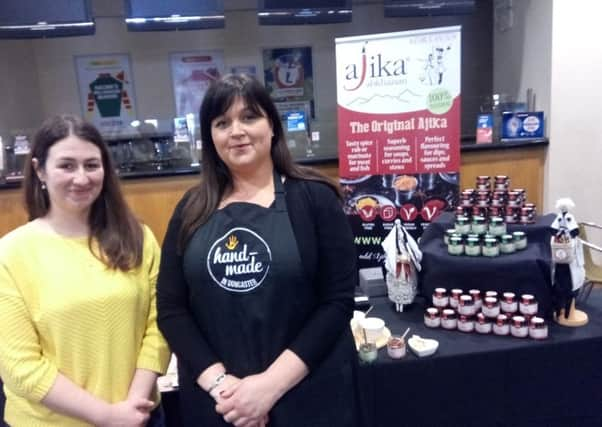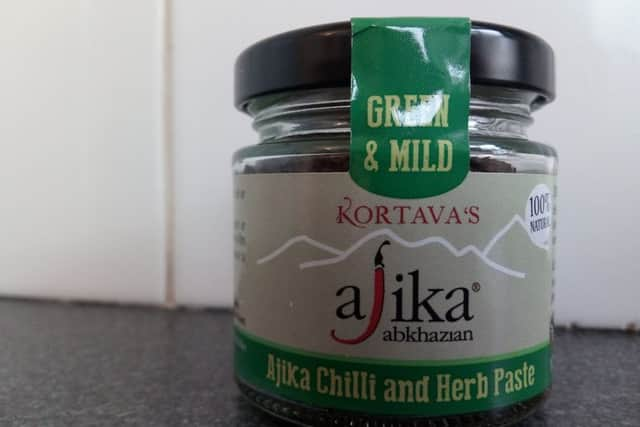Feature: Doncaster mum's business enjoys added spice after her MS diagnosis


She had been living abroad at the time in the Black Sea area of Abkhazia, formerly part of the USSR, where her mum was originally from.
But that changed in 2015 when Gunda was diagnosed with MS.


She said: “I had been living abroad with my husband and two children, aged six and three.
Advertisement
Hide AdAdvertisement
Hide Ad“When I was diagnosed, we had to move back to Doncaster because the heath care support was not available in Abkhazia.”
But Gunda, aged 33, from Sprotbrough, was determined to turn a negative into a positive.
And for her, that meant setting up a business back here in Doncaster.


When the family had received visitors from South Yorkshire during their time abroad, they had said how much they liked a local delicacy called Ajika – a sort of spicy cooking ingredient used by locals in Abkhazia.
Advertisement
Hide AdAdvertisement
Hide AdThey could not find it in the UK, so they brought bags of it back from abroad.
Having realised she needed to come back to Yorkshire, Gunda set up a plan–- to make her own in Doncaster.
After experimenting in her kitchen at home in Doncaster, she started selling it locally.


Initially, she started selling it outside a local deli, near Doncaster Market.
And the product proved popular.
Advertisement
Hide AdAdvertisement
Hide Ad“The response was amazing - within a week I realised we had a viable product,” she said. “People were telling me how they used it with all sorts of dishes, That was in August 2016.
“After that we started doing trade shows, consumer events and farmers’ markets.


“We expanded and started selling it at places like Elsecar in Barnsley and Wentworth.
“We started to get customers returned, so we started selling online.
Advertisement
Hide AdAdvertisement
Hide Ad“The we started to extend the range. What we were making was too hot for some people, so we started using different types of chillis, so we had medium and mild versions.
“We started out making it at home, but last year we opened a factory on Queensgate, at the Waterdale Centre, into a nation where my and my husband Astamur work.”
The factory is now used both for production and sales, with a factory shop that sells not just their own product, but other Doncaster produced foodstuffs. “We want to make it into a national or international product,” said Gunda.
“We think it should be in everyone’s cupboard.”
“We’ve started this up from zero. We are finding the biggest challenge is to get the food industry to understand it.”
Advertisement
Hide AdAdvertisement
Hide AdGunda received support from an organisation called Handmade in Doncaster.
They helped her found places to sell Ajika, which she says took pressure off her.
It is now sold in places including Potteric Carr and the Yorkshire Wildlife Park.
Handmade in Doncaster has been set up locally to work with residents so that they can find buyers for a vast range of products, ranging from foodstuffs to lighting products.
Advertisement
Hide AdAdvertisement
Hide AdSo far around 80 businesses have signed up for the organisation, which is using its contacts to find outlets in shops around the borough and beyond.
The include Gunda, who has set up Kortava’s Ajika, making specialist food which is now produced in a factory in Doncaster.
Hazel Sykes is running Handmade in Doncaster as a sideline from her main job as an HR business consultant with Doncaster Council.
She said: “We found that we were coming across a lot of people at job centres and jobs fairs, who made things, but who had not managed to turn it into a business.
“They needed very specific support.
Advertisement
Hide AdAdvertisement
Hide Ad“They were creative people in need of support with sales and finding outlets for their products.
“We can promote their products. We go to outlets like cafes, garden centres and retailers and link them together.
“We have helped people get their products in places like Walkers Garden Centre, or Cusworth Hall.
“We started in January last year and we’ve got 80 businesses involved now.”
Advertisement
Hide AdAdvertisement
Hide AdHazel and her team take books out with them containing the details of the products that their members make.
They then show them how to make contacts at outlets locally, who can choose items they want to stock.
Some of the producers are also starting their own online shops.
They are also now running networking events with speakers from organisations like trading standards, or social media experts.
“Ultimately, we want those people to become businesses.”